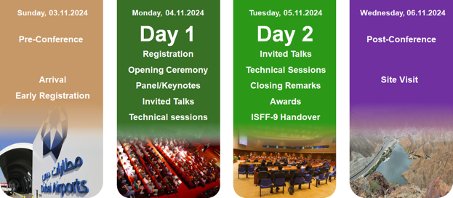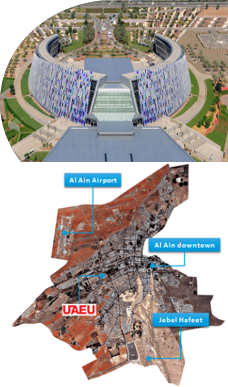8th International Symposium on Flash Floods in Wadi Systems
1. INFO
- Title: Eighth International Symposium on Flash Floods in Wadi Systems
- Main Theme: Flash Floods, Water Harvesting, and Groundwater Recharge Potentials
- Venue: Crescent Building, United Arab Emirates University, Al Ain, UAE
- Dates: November 4-5, 2024, Al Ain, UAE
2. About Conference
Climate change has caused more frequent, severe heavy rainfall events, causing human and economic damage. Large-scale urbanization, population increase in flood-prone areas, deforestation, climate change, and increasing sea levels will leave more people exposed to hazardous floods. Extreme weather and climate can devastate societies and the environment. A third of the planet’s landmass is arid or semi-arid. These regions are prone to flash floods due to localized convective rainfall and poor soil development. Flash floods vary by climate and have a short response time between rainfall and stream network discharge peak due to their short duration, narrow area, strong downpours, high flood peaks, and quick flows. Flash floods have large socio-economic repercussions due to their abrupt onset. Moreover, flash flood forecasting is difficult in the arid and semi-arid regions due to the lack of hydrological and meteorological data. Floods in wadis, on the other hand, are an important source of water, especially for groundwater recharge. Flash flood hazard assessment is hampered by a paucity of monitoring and observational data. Thus, flash flood research is becoming increasingly important. By cascading natural hazards, combined events can worsen the situation. Compound hydrometeorological extremes including floods, surges, droughts, heat waves, soil erosion, and sedimentation pose huge risks to people and properties. Understanding compound hydrometeorological extremes helps us mitigate and adapt. Flood impacts may worsen if we don't learn from the lessons and improve society resilience. Climate resilience and disaster prevention must supplement emergency response. This requires looking beyond the next flood or storm to understand long-term climate vulnerabilities to prepare for and adapt to future weather extremes and other climate consequences through disaster risk reduction initiatives. Scientists, practitioners, and citizens from local, regional, and worldwide organizations—public or private—must work together to solve these complex disasters.
Since its inception in Japan in 2015, the International Symposium on Flash Floods in Wadi Systems (ISFF) has been touring MENA nations such as Egypt, Oman, Morocco, Jordan, and Algeria. The Eighth International Symposium on Flash Floods in Wadi Systems (ISFF8) is organized by the National Water and Energy Center, UAE University, on November 4-5, 2024. The two-day symposium will take place in Al Ain City, United Arab Emirates, on the campus of the UAE University. This version will convene on the theme "Flash Floods, Water Harvesting, and Groundwater Recharge Potentials".
ISFF8 will assist the community in strengthening the network, promoting actions, raising awareness, ensuring coordination and collaboration, establishing common goals and targets, monitoring progress, and taking effective measures to address a variety of flood-related issues. The event will address flash flood knowledge gaps, including the lack of access to the latest information and technology needed to generate effective warnings, and promote worldwide development and collaboration. The event will provide hydrological modelers, operational forecasters, and disaster management agencies with cutting-edge knowledge, technologies, and advice products on small-scale flash floods.
ISFF8 will focus on groundwater recharge and climate change and water-related hazards such flash floods and sediment disasters.
It will be an opportunity to share knowledge, experiences, research, and lessons learned from recent flood and sediment disasters and successful groundwater recharge attempts form flood water.
This symposium is a premier forum for researchers, experts, engineers, practitioners, planners, managers, and decision makers to discuss and share recent advances in science, technology, modeling, and practices for better water-related disaster risk management and climate adaptation policies. Keynote speeches, oral presentations, and poster sessions exhibiting contemporary innovations and research discoveries will address flood-related issues across the two-day event. Pre-conference interactive workshops will cover present and future challenges and potential for change, as well as flash flood technologies and methods.
Continuing to share knowledge, experiences and lessons learned by all participants, ISFF8 organizers welcome presentations from all relevant fields.
3. PROGRAM
3.1 CONFERENCE THEMES
The main theme of this version of the symposium will focus on “Flash Floods, Water Harvesting, and Groundwater Recharge Potentials”. The following topics will be covered in technical sessions, posters, and workshops:
- Water resources management under climate change: challenges and opportunities
- Surface runoff, water harvesting, and groundwater recharge
- Cloud seeding and compound hydrometeorological extremes
- Data challenges: acquisition, monitoring, analysis, and sharing
- Soil erosion, sediment yield and deposition, and reservoir sedimentation
- Advances in flash flood real-time measurement, modeling, forecasting, risk perception, and warning systems
3.2 COMMITTEES
|
Organizing Committee |
Scientific Committee |
|
|
Prof. Dalal Al Shamsi |
Conference Chair |
Prof. Mohsen Sherif |
|
Prof. Mohsen Sherif |
Organization Committee Chair |
Prof. Tetsuya Sumi |
|
Prof. Ahmed Sefelnasr |
Secretary General |
Prof. Ahmed Sefelnasr |
|
Dr. Tareefa Al Sumaiti |
|
Prof. Dalal Alshamsi |
|
Prof. Abdel Azim Ebraheem |
|
Prof. Sameh Kantoush |
|
Prof. Sameh Kantoush |
|
Dr. Mohamed Saber |
|
Prof. Mohamed Saber |
|
Prof. Abdel Azim Ebraheem |
|
Eng. Khaled Alghafli |
|
Prof. Ali Al-Maktoumi |
|
Ms. Hana Gawish |
|
Prof. Ekkehard Holzbecher |
|
Ms. Alia Al Suwaider |
|
Prof. Dalila Loudyi |
|
Ms. Abeer Alymahi |
|
Prof. Chérifa Abdelbaki |
|
Ms. Hind Alsheryani |
|
Prof. Habib Abida |
|
Dr. Saifudeen Kabeer |
|
Prof. Ashraf Elmoustafa |
|
Ms. Noura Al Dhaheri |
|
Dr. Mohammed Abdelfattah |
|
Mr. Ali Fadl |
|
Dr. Jalel Aouissi |
|
Ms. Rafeea Al Qemzi |
|
Dr. Emad Mabrouk |
|
Ms. Mariam Al Qemzi |
|
Dr. Hamouda Boutaghane |
|
Ms. Mouza Al Darmaki |
|
|
|
Mr. Ibrahim Talal |
|
|
3.3 TENTATIVE AGENDA

3.4 WORKSHOPS
TBD
3.5 Social Events
TBD
4. CALL FOR ABSTRACTS
Your submission must be written in English. This should plainly summarize your presentation.
All submissions must be received by our online submission system by May 30, 2024.
Authors must utilize the official Template and include the sections of the manuscript outlined in the template.
All submissions must be formatted in Microsoft Word and uploaded to the online submission system.
Please designate the relevant track to your submission in the online submission system.
Authors are invited to submit abstracts, extended abstracts, or full-length articles in accordance with the symposium designated tracks.
Submissions must be composed in Arial font, 11-point font size, single line spacing, and left alignment. Abstracts must include the title, author's name, affiliation, country, mailing address, email address, and contact author's designation.
Abstracts should be no longer than 500 words (no graphs, references, or citations allowed).
Extended abstracts should not exceed 4 A4 pages and should adhere to the same guidelines and formats as full-length papers.
Authors are encouraged to submit a full-length paper for review and possible post-conference publication. Full-length papers should not be less than 10 A4 pages and must be submitted using the template provided.
After review, all accepted abstracts will be assigned to the final conference program after confirming the registration and payment of all presenters.
Participants will receive the full proceedings with the final program.
Authors are encouraged to submit a full-length paper for review and possible post-conference publication. Full-length papers should not be less than 10 A4 pages and must be submitted using the template provided.
After review, all accepted abstracts will be assigned to the final conference program after confirming the registration and payment of all presenters.
Participants will receive a full digital proceeding with the final program.
4.1 IMPORTANT DATES
Conference Dates : 4-5 Nov 2024
Registration open : 01 Dec 2023
Registration close : 04 Nov 2024
Submission open : 01 Dec 2023
Submission close : 30 May 2024
Acceptance notification : 30 Jun 2024
Full length papers : 15 Aug 2024

5. REGISTER
5.1 Registration Information
A maximum of two abstracts or full-length articles may be submitted with a full symposium registration.
Access to all sessions, seminars, the welcome reception, all conference materials, lunches, coffee breaks, site visits, and social events is included with registration.
During the event days, UAEU will provide complimentary local transportation to and from the venue.
Once the completed form and payment are received and processed by the Conference Office, registrations will be confirmed. On-site registration fees must be paid with a credit card or debit card. Cash is not acceptable.
6. AWARDS
Accepted full-length papers, abstracts, and posters are eligible for a conference award. All winners will be announced and presented at the closing ceremony. The following awards will be bestowed:
- Best Paper Award
- Best Poster Award
- Student Award
7. VENUE/INFO
7.1 VENUE
United Arab Emirates University
 The United Arab Emirates University (UAEU), the oldest and largest University in the UAE, was established in 1976 by the late Sheikh Zayed bin Sultan Al Nahyan. UAEU is situated in Al Ain, which is also referred to as the "City of the Oasis" due to its verdant mountainous park, verdant Mubazzara, and Jebel Hafeet, the highest mountains in the region. One may partake in a picnic, a mild excursion, or a refreshing swim in the park's natural hot springs at this location. Additionally, UAEU is recognized as a comprehensive, research-driven institution dedicated to excellence in teaching and research, as well as innovation. UAEU, the preeminent institution in the United Arab Emirates, provides a comprehensive selection of superior graduate and undergraduate programs that are globally recognized. These programs are delivered across nine colleges, namely Business and Economics, Science, Education, Engineering, Food and Agriculture, Humanities and Social Science, IT, Law, Medicine, and Health Sciences. Research centers established by the university are contributing to the advancement of knowledge in crucial domains such as space, cancer treatments and water resources. Furthermore, we would like to take this opportunity and encourage you to extend your stay in Al Ain city and experience the unique nature and the diverse touristic activities of the place.
The United Arab Emirates University (UAEU), the oldest and largest University in the UAE, was established in 1976 by the late Sheikh Zayed bin Sultan Al Nahyan. UAEU is situated in Al Ain, which is also referred to as the "City of the Oasis" due to its verdant mountainous park, verdant Mubazzara, and Jebel Hafeet, the highest mountains in the region. One may partake in a picnic, a mild excursion, or a refreshing swim in the park's natural hot springs at this location. Additionally, UAEU is recognized as a comprehensive, research-driven institution dedicated to excellence in teaching and research, as well as innovation. UAEU, the preeminent institution in the United Arab Emirates, provides a comprehensive selection of superior graduate and undergraduate programs that are globally recognized. These programs are delivered across nine colleges, namely Business and Economics, Science, Education, Engineering, Food and Agriculture, Humanities and Social Science, IT, Law, Medicine, and Health Sciences. Research centers established by the university are contributing to the advancement of knowledge in crucial domains such as space, cancer treatments and water resources. Furthermore, we would like to take this opportunity and encourage you to extend your stay in Al Ain city and experience the unique nature and the diverse touristic activities of the place.
8. CONTACT
National Water and Energy Center
United Arab Emirates University
P.O. Box 15551, Al Ain, UAE
Email: ISFF8@uaeu.ac.ae
Tel.: +971 3713 4483